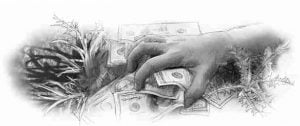The Influence of Materialism
Key Thought: When we use material blessings to honor God and help others, we are blessed. When we become materialistic, we lose that blessing.
January 6, 2018
1. Have a volunteer read Luke 14:26-33.
a. Ask class members to share a thought on what the most important point in this text is.
b. How do we keep our money, and need for it in the right Biblical perspective?
c. Personal Application : How can we know if the things we own, own us as well? Share your thoughts.
d. Case Study : One of your relatives states: “Is it possible for poor people to be guilty of lusting after riches and material goods, even if they don’t have many?” How would you respond to your relative?
2. Have a volunteer read Luke 12:15-21.
a. Ask class members to share a short thought on what the most important point is in this passage.
b. How does our attitude toward possessions influence our self-identity?
c. Personal Application : How can our possessions be used to glorify God and improve our world? Share your thoughts.
d. Case Study : One of your friends states, “Is it possible that the accumulation of wealth or material things can increase a person’s spirituality, love of God, and desire for heavenly things?” How would you respond to your friend?
3. Have a volunteer read I Timothy 6:10.
a. Ask class members to share a short thought on what the main idea of this text is.
b. Can middle-class and poor people be just as guilty of the love of money as rich people? Can rich people not be guilty of the love of money? How does love of money bring many sorrows?
c. Personal Application: Think about how you spend your money in a month. How much was spent on self; essentials and non-essentials, helping others, for God’s kingdom? Does this indicate materialism, spiritualism, or something else? Share your thoughts.
d. Case Study: One of your neighbors states, “Most people have money as a god. No matter how much money they have, the more they want. No matter what house, car, toys, clothes they have; the more they want. This is a consumer driven economy. People are enticed to want and buy. People go in debt. Nobody’s satisfied with what they have.” How would you respond to your neighbor?
4. Have a volunteer read Matthew 6:22-24.
a. Ask class members to share a short thought on what the main idea of this text is.
b. What do the eyes represent according to Christian thought and action?
c. Personal Application : What practical choices can we make to protect ourselves against the temptation to hoard things for ourselves rather than allowing God to use us as channels of distribution? Share your thoughts.
d. Case Study : Think of one person who needs to hear a message from this week’s lesson. Tell the class what you plan to do this week to share with them.
(Truth that is not lived, that is not imparted, loses its life-giving power, its healing virtue. Its blessings can be retained only as it is shared.”Ministry of Healing, p. 148).

